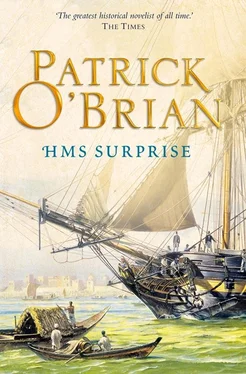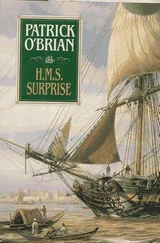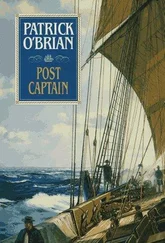They turned it to the technical questions of impressment, tenders and guardships, matters outside Sir Joseph’s province, and he leant back in his chair, watching the speakers, assessing their abilities. Poor, on the whole; and the new First Lord was a fool, a mere politician. Sir Joseph had served under Chatham, Spencer, St Vincent and Melville, and this man made a pitiful figure beside them: they had had their failings, particularly Chatham, but not one would so have missed the point – the whole expense in this case would have been borne by the Spaniards; it would have been the Spaniards who provided the Royal Navy with the splendid example of four youngish post-captains caught in a great shower, a downpour, of gold – the money would not have left the country. Naval fortunes were not so common; and the fortunes there were had nearly all been amassed by admirals in lucrative commands, taking their flag-share for innumerable captures in which they personally took no part whatsoever. The captains who fought the ships – those were the men to encourage. Perhaps he had not made his point as clearly or as forcibly as he should have done: he was not in form after a sleepless night with seven reports from Boulogne to digest. But in any case, no other First Lord except perhaps St Vincent would have made the question turn on party politics. And quite certainly not a single one of them would have blurted out the name of a secret agent.
Both Lord Melville (a man who really understood intelligence – a splendid First Lord) and Sir Joseph were much attached to Dr Maturin, their adviser on Spanish and especially Catalan affairs, a most uncommon, wholly disinterested agent, brave, painstaking, utterly reliable and ideally qualified, who had never accepted the slightest reward for his services – and such services! It was he who had brought them the intelligence that had allowed them to deliver this crippling blow. Sir Joseph and Lord Melville had devised the temporary commission as a means of obliging him to accept a fortune, supplied by the enemy; and now his name had been brayed out in public – not even in the comparative privacy of the Board, but in a far more miscellaneous gathering – with the question openly directed at the chief of naval intelligence. It was unqualifiable. To rely on the discretion of these sailors whose only notion of dealing with an enemy as cunning as Bonaparte was to blow him out of the water, was unqualifiable. To say nothing of the civilians, the talkative politicians, whose nearest approach to danger was a telescope on Dover cliffs, where they could look at Bonaparte’s invasion army, two hundred thousand strong, camped on the other side of the water. He looked at the faces round the long table; they were growing heated about the relative jurisdictions of the impress service proper and the gangs from the ships – admiral called to admiral in voices that could be heard in Whitehall, and the First Lord seemed to have no control of the meeting whatsoever. Sir Joseph took comfort from this – the gaffe might be forgotten. ‘But still,’ he said to himself, drawing the metamorphoses of a red admiral, egg, caterpillar, chrysalis and imago on his pad, ‘what shall I say to him when we meet? What kind of face can I put on it, when I see him?’
In Whitehall a grey drizzle wept down upon the Admiralty, but in Sussex the air was dry – dry and perfectly still. The smoke rose from the chimney of the small drawing-room at Mapes Court in a tall, unwavering plume, a hundred feet before its head drifted away in a blue mist to lie in the hollows of the downs behind the house. The leaves were hanging yet, but only just, and from time to time the bright yellow rounds on the tree outside the window dropped of themselves, twirling in their slow fall to join the golden carpet at its foot, and in the silence the whispering impact of each leaf could be heard – a silence as peaceful as an easy death.
‘At the first breath of a wind those trees will all be bare,’ observed Dr Maturin. ‘Yet autumn is a kind of spring, too; for there is never a one but is pushed off by its own next-coming bud. You see that so clearly farther south. In Catalonia, now, where you and Jack are to come as soon as the war is over, the autumn rains bring up the grass like an army of spears; and even here – my dear, a trifle less butter, if you please. I am already in a high state of grease.’
Stephen Maturin had dined with the ladies of Mapes, Mrs Williams, Sophia, Cecilia and Frances – traces of brown windsor soup, codfish, pigeon pie, and baked custard could be seen on his neck-cloth, his snuff-coloured waistcoat and his drab breeches, for he was an untidy eater and he had lost his napkin before the first remove, in spite of Sophia’s efforts at preserving it – and now he was sitting on one side of the fire drinking tea, while Sophia toasted him crumpets on the other, leaning forward over the pink and silver glow with particular attention neither to scorch the crumpet by holding it too close nor to parch it by holding it too far down. In the fading light the glow caught her rounded forearm and her lovely face, exaggerating the breadth of her forehead and the perfect cut of her lips, emphasising the extraordinary bloom of her complexion. Her anxiety for the crumpet did away with the usual reserve of her expression; she had her younger sister’s trick of showing the tip of her tongue when she was concentrating, and this, with so high a degree of beauty, gave her an absurdly touching appearance. He looked at her with great complacency, feeling an odd constriction at his heart, a feeling without a name: she was engaged to be married to his particular friend, Captain Aubrey of the Navy; she was his patient; and they were as close as a man and a woman can be where there is no notion of gallantry between them – closer, perhaps, than if they had been lovers. He said, ‘This is an elegant crumpet, Sophie, to be sure: but it must be the last, and I do not recommend another for you, my dear, either. You are getting too fat. You were quite haggard and pitiful not six months ago; but the prospect of marriage suits you, I find. You must have put on half a stone, and your complexion … Sophie, why do you thread, transpierce another crumpet? Who is that crumpet for? For whom is that crumpet, say?’
‘It is for me, my dear. Jack said I was to be firm – Jack loves firmness of character. He said that Lord Nelson…’
Far, far over the still and almost freezing air came the sound of a horn on Polcary Down. They both turned to the window. ‘Did they kill their fox, I wonder, now?’ said Stephen. ‘If Jack were home, he would know, the animal.’
‘Oh, I am so glad he is not out there on that wicked great bay,’ said Sophia. ‘It always managed to get him off, and I was always afraid he would break his leg, like young Mr Savile. Stephen, will you help me draw the curtain?’
‘How she has grown up,’ said Stephen privately. And aloud, as he looked out of the window, holding the cord in one hand, ‘What is the name of that tree? The slim exotic, standing on the lawn?’
‘We call it the pagoda-tree. It is not a real pagoda-tree, but that is what we call it. My uncle Palmer, the traveller, planted it; and he said it was very like.’
As soon as she had spoken Sophia regretted it – she regretted it even before the sentence was out, for she knew where the word might lead Stephen’s mind.
These uneasy intuitions are so often right: to anyone who had the least connection with India the pagoda-tree must necessarily be associated with those parts. Pagodas were small gold coins resembling its leaves, and shaking the pagoda-tree meant making an Indian fortune, becoming a nabob – a usual expression. Both Sophia and Stephen were concerned with India, because Diana Villiers was said to be there, with her lover and indeed keeper Richard Canning. Diana was Sophia’s cousin, once her rival for the affections of Jack Aubrey, and at the same time the object of Stephen’s eager, desperate pursuit – a dashing young woman of surprising charms and undaunted firmness of character, who had been very much part of their lives until her elopement with Mr Canning. She was the black sheep of the family, of course, the scabbed ewe, and in principle her name was never mentioned at Mapes; yet it was surprising how much they knew about her movements and how great a place she occupied in their thoughts.
Читать дальше












